Racism's Impact on Aboriginal Health in Australia: A Critical Analysis
VerifiedAdded on 2022/11/13
|17
|4060
|111
Essay
AI Summary
This essay delves into the critical issue of racism as a social determinant of health, specifically focusing on its profound impact on the Aboriginal community in Australia. It begins by tracing the historical roots of racism and its contemporary manifestations, highlighting governmental negligence and the violation of human rights. The paper examines how racism leads to health disparities, particularly for the Aboriginal population, who experience discrimination in various aspects of life, including access to resources and healthcare. It explores the multiple pathways through which racism affects health, including unequal access to societal resources, increased exposure to health risk factors, and the triggering of negative cognitive reactions and stress, which impact mental and physical health. The essay further analyzes the vulnerability of the Aboriginal and Torres Strait Islander people to racism, citing statistics on discrimination in healthcare and its effects on mortality rates. It also examines the social determinants of health, such as education, employment, and social support, and how racism hinders these, leading to poor health outcomes. The paper concludes by discussing policy implications and measures to address the discrimination faced by the Aboriginal community, emphasizing human rights and the need for legislative and social change to improve health outcomes and reduce inequalities.
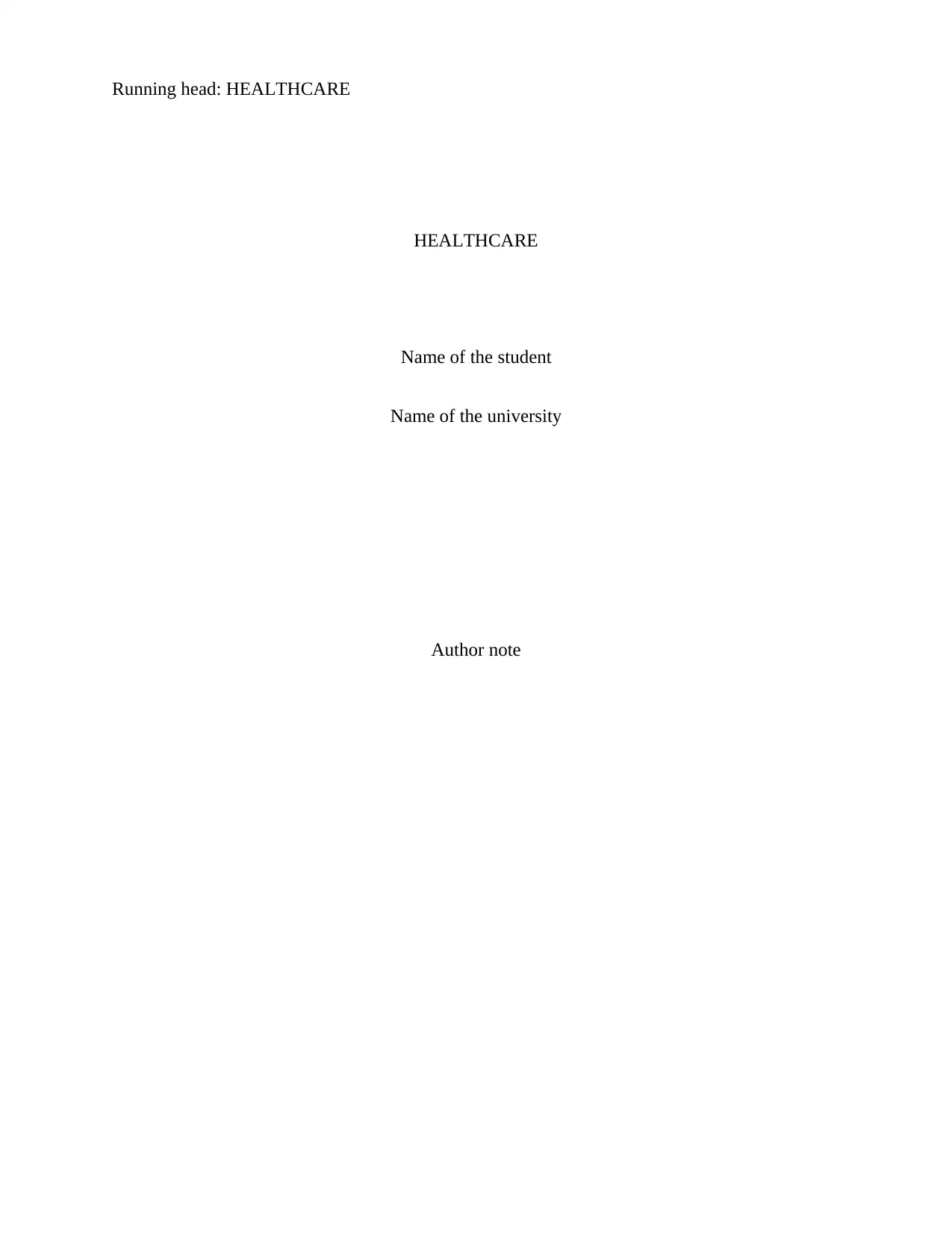
Running head: HEALTHCARE
HEALTHCARE
Name of the student
Name of the university
Author note
HEALTHCARE
Name of the student
Name of the university
Author note
Paraphrase This Document
Need a fresh take? Get an instant paraphrase of this document with our AI Paraphraser
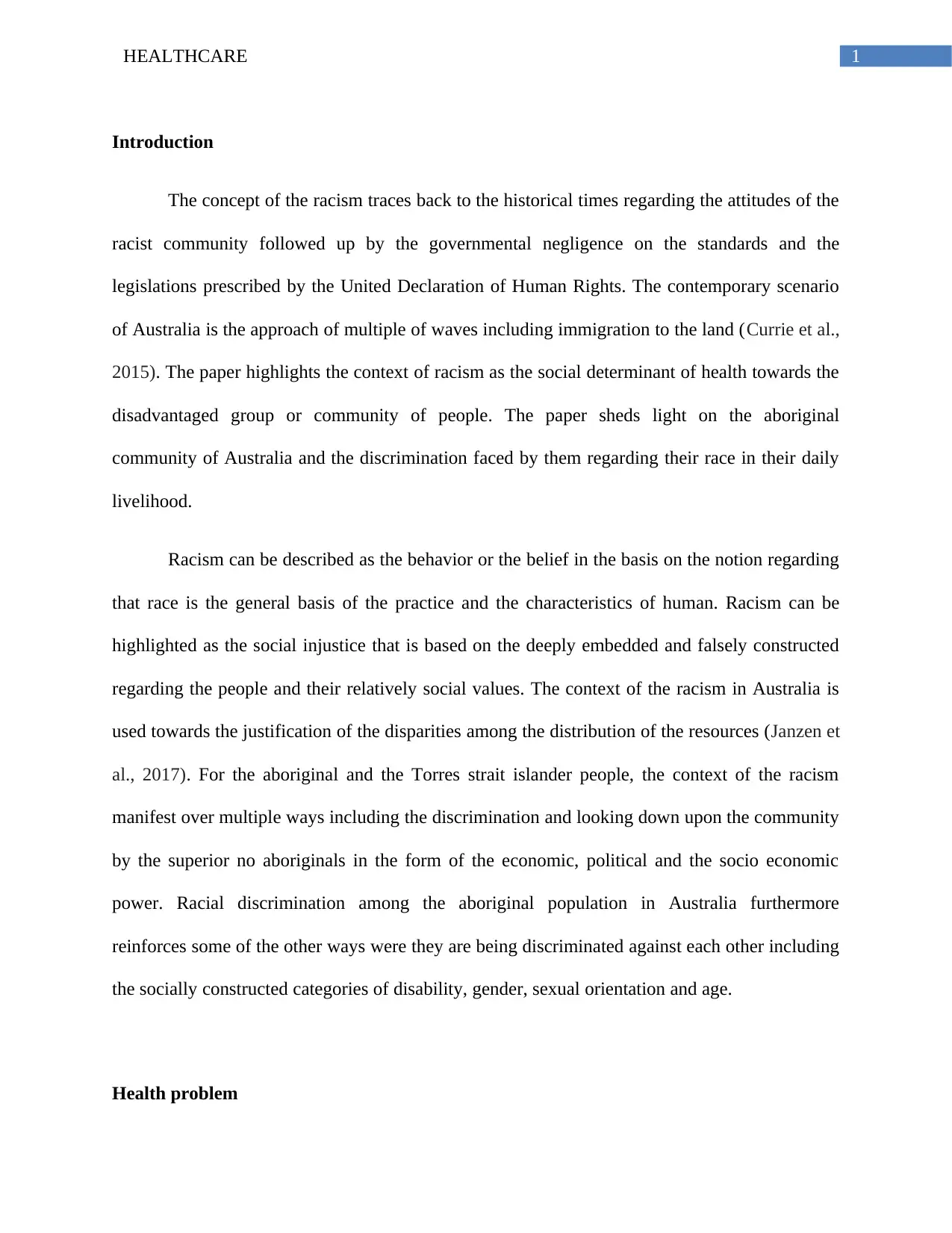
HEALTHCARE 1
Introduction
The concept of the racism traces back to the historical times regarding the attitudes of the
racist community followed up by the governmental negligence on the standards and the
legislations prescribed by the United Declaration of Human Rights. The contemporary scenario
of Australia is the approach of multiple of waves including immigration to the land (Currie et al.,
2015). The paper highlights the context of racism as the social determinant of health towards the
disadvantaged group or community of people. The paper sheds light on the aboriginal
community of Australia and the discrimination faced by them regarding their race in their daily
livelihood.
Racism can be described as the behavior or the belief in the basis on the notion regarding
that race is the general basis of the practice and the characteristics of human. Racism can be
highlighted as the social injustice that is based on the deeply embedded and falsely constructed
regarding the people and their relatively social values. The context of the racism in Australia is
used towards the justification of the disparities among the distribution of the resources (Janzen et
al., 2017). For the aboriginal and the Torres strait islander people, the context of the racism
manifest over multiple ways including the discrimination and looking down upon the community
by the superior no aboriginals in the form of the economic, political and the socio economic
power. Racial discrimination among the aboriginal population in Australia furthermore
reinforces some of the other ways were they are being discriminated against each other including
the socially constructed categories of disability, gender, sexual orientation and age.
Health problem
Introduction
The concept of the racism traces back to the historical times regarding the attitudes of the
racist community followed up by the governmental negligence on the standards and the
legislations prescribed by the United Declaration of Human Rights. The contemporary scenario
of Australia is the approach of multiple of waves including immigration to the land (Currie et al.,
2015). The paper highlights the context of racism as the social determinant of health towards the
disadvantaged group or community of people. The paper sheds light on the aboriginal
community of Australia and the discrimination faced by them regarding their race in their daily
livelihood.
Racism can be described as the behavior or the belief in the basis on the notion regarding
that race is the general basis of the practice and the characteristics of human. Racism can be
highlighted as the social injustice that is based on the deeply embedded and falsely constructed
regarding the people and their relatively social values. The context of the racism in Australia is
used towards the justification of the disparities among the distribution of the resources (Janzen et
al., 2017). For the aboriginal and the Torres strait islander people, the context of the racism
manifest over multiple ways including the discrimination and looking down upon the community
by the superior no aboriginals in the form of the economic, political and the socio economic
power. Racial discrimination among the aboriginal population in Australia furthermore
reinforces some of the other ways were they are being discriminated against each other including
the socially constructed categories of disability, gender, sexual orientation and age.
Health problem
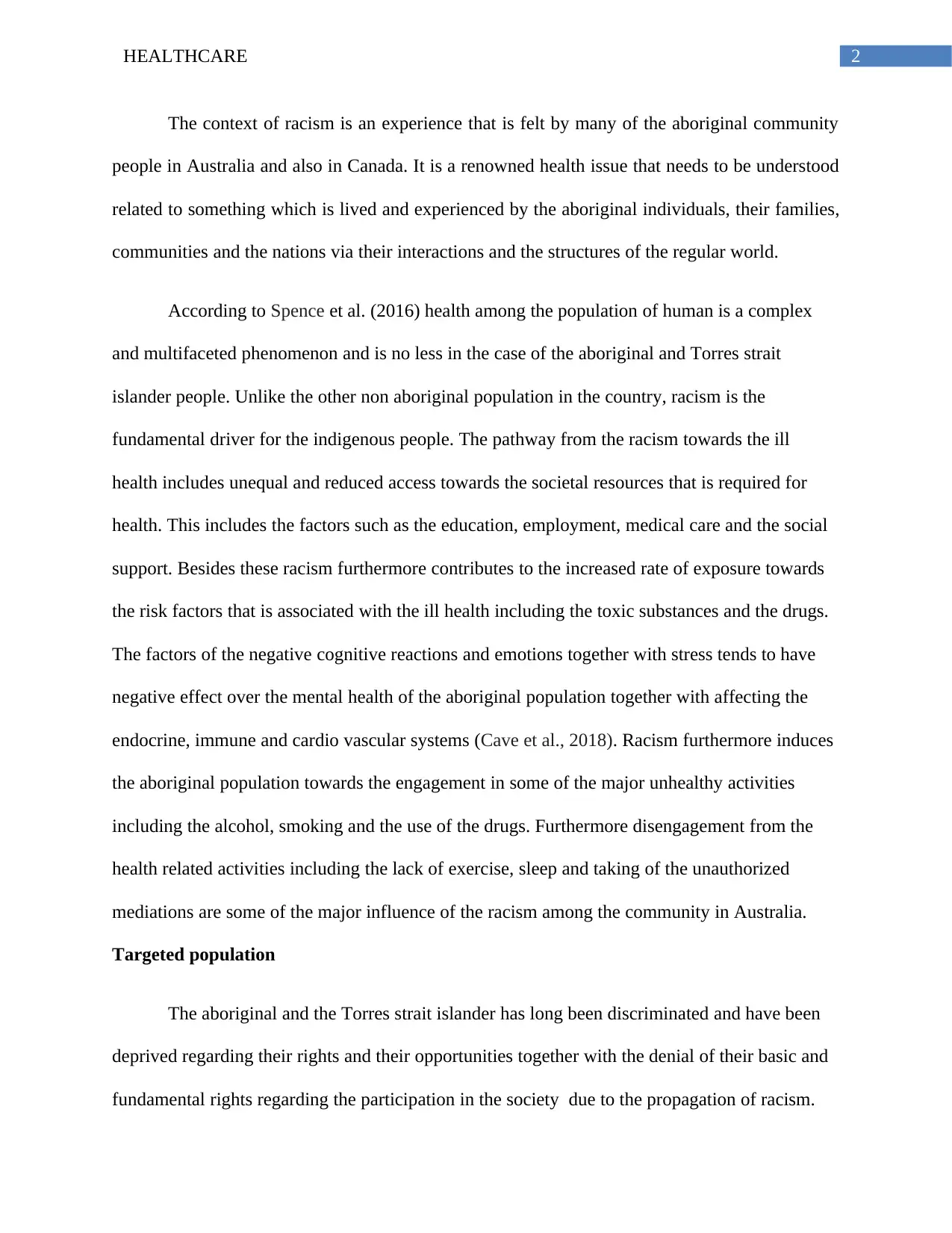
2HEALTHCARE
The context of racism is an experience that is felt by many of the aboriginal community
people in Australia and also in Canada. It is a renowned health issue that needs to be understood
related to something which is lived and experienced by the aboriginal individuals, their families,
communities and the nations via their interactions and the structures of the regular world.
According to Spence et al. (2016) health among the population of human is a complex
and multifaceted phenomenon and is no less in the case of the aboriginal and Torres strait
islander people. Unlike the other non aboriginal population in the country, racism is the
fundamental driver for the indigenous people. The pathway from the racism towards the ill
health includes unequal and reduced access towards the societal resources that is required for
health. This includes the factors such as the education, employment, medical care and the social
support. Besides these racism furthermore contributes to the increased rate of exposure towards
the risk factors that is associated with the ill health including the toxic substances and the drugs.
The factors of the negative cognitive reactions and emotions together with stress tends to have
negative effect over the mental health of the aboriginal population together with affecting the
endocrine, immune and cardio vascular systems (Cave et al., 2018). Racism furthermore induces
the aboriginal population towards the engagement in some of the major unhealthy activities
including the alcohol, smoking and the use of the drugs. Furthermore disengagement from the
health related activities including the lack of exercise, sleep and taking of the unauthorized
mediations are some of the major influence of the racism among the community in Australia.
Targeted population
The aboriginal and the Torres strait islander has long been discriminated and have been
deprived regarding their rights and their opportunities together with the denial of their basic and
fundamental rights regarding the participation in the society due to the propagation of racism.
The context of racism is an experience that is felt by many of the aboriginal community
people in Australia and also in Canada. It is a renowned health issue that needs to be understood
related to something which is lived and experienced by the aboriginal individuals, their families,
communities and the nations via their interactions and the structures of the regular world.
According to Spence et al. (2016) health among the population of human is a complex
and multifaceted phenomenon and is no less in the case of the aboriginal and Torres strait
islander people. Unlike the other non aboriginal population in the country, racism is the
fundamental driver for the indigenous people. The pathway from the racism towards the ill
health includes unequal and reduced access towards the societal resources that is required for
health. This includes the factors such as the education, employment, medical care and the social
support. Besides these racism furthermore contributes to the increased rate of exposure towards
the risk factors that is associated with the ill health including the toxic substances and the drugs.
The factors of the negative cognitive reactions and emotions together with stress tends to have
negative effect over the mental health of the aboriginal population together with affecting the
endocrine, immune and cardio vascular systems (Cave et al., 2018). Racism furthermore induces
the aboriginal population towards the engagement in some of the major unhealthy activities
including the alcohol, smoking and the use of the drugs. Furthermore disengagement from the
health related activities including the lack of exercise, sleep and taking of the unauthorized
mediations are some of the major influence of the racism among the community in Australia.
Targeted population
The aboriginal and the Torres strait islander has long been discriminated and have been
deprived regarding their rights and their opportunities together with the denial of their basic and
fundamental rights regarding the participation in the society due to the propagation of racism.
⊘ This is a preview!⊘
Do you want full access?
Subscribe today to unlock all pages.

Trusted by 1+ million students worldwide
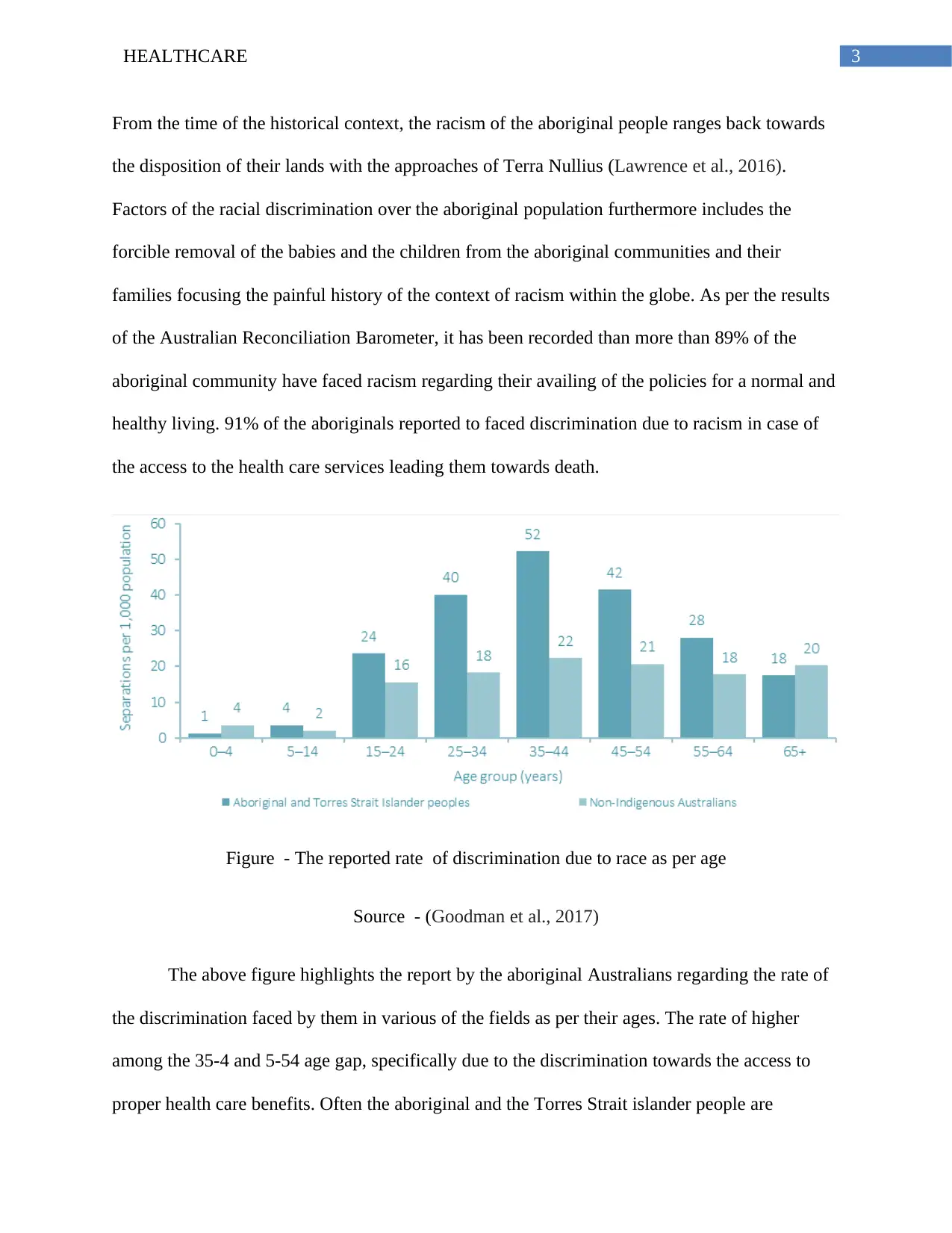
3HEALTHCARE
From the time of the historical context, the racism of the aboriginal people ranges back towards
the disposition of their lands with the approaches of Terra Nullius (Lawrence et al., 2016).
Factors of the racial discrimination over the aboriginal population furthermore includes the
forcible removal of the babies and the children from the aboriginal communities and their
families focusing the painful history of the context of racism within the globe. As per the results
of the Australian Reconciliation Barometer, it has been recorded than more than 89% of the
aboriginal community have faced racism regarding their availing of the policies for a normal and
healthy living. 91% of the aboriginals reported to faced discrimination due to racism in case of
the access to the health care services leading them towards death.
Figure - The reported rate of discrimination due to race as per age
Source - (Goodman et al., 2017)
The above figure highlights the report by the aboriginal Australians regarding the rate of
the discrimination faced by them in various of the fields as per their ages. The rate of higher
among the 35-4 and 5-54 age gap, specifically due to the discrimination towards the access to
proper health care benefits. Often the aboriginal and the Torres Strait islander people are
From the time of the historical context, the racism of the aboriginal people ranges back towards
the disposition of their lands with the approaches of Terra Nullius (Lawrence et al., 2016).
Factors of the racial discrimination over the aboriginal population furthermore includes the
forcible removal of the babies and the children from the aboriginal communities and their
families focusing the painful history of the context of racism within the globe. As per the results
of the Australian Reconciliation Barometer, it has been recorded than more than 89% of the
aboriginal community have faced racism regarding their availing of the policies for a normal and
healthy living. 91% of the aboriginals reported to faced discrimination due to racism in case of
the access to the health care services leading them towards death.
Figure - The reported rate of discrimination due to race as per age
Source - (Goodman et al., 2017)
The above figure highlights the report by the aboriginal Australians regarding the rate of
the discrimination faced by them in various of the fields as per their ages. The rate of higher
among the 35-4 and 5-54 age gap, specifically due to the discrimination towards the access to
proper health care benefits. Often the aboriginal and the Torres Strait islander people are
Paraphrase This Document
Need a fresh take? Get an instant paraphrase of this document with our AI Paraphraser
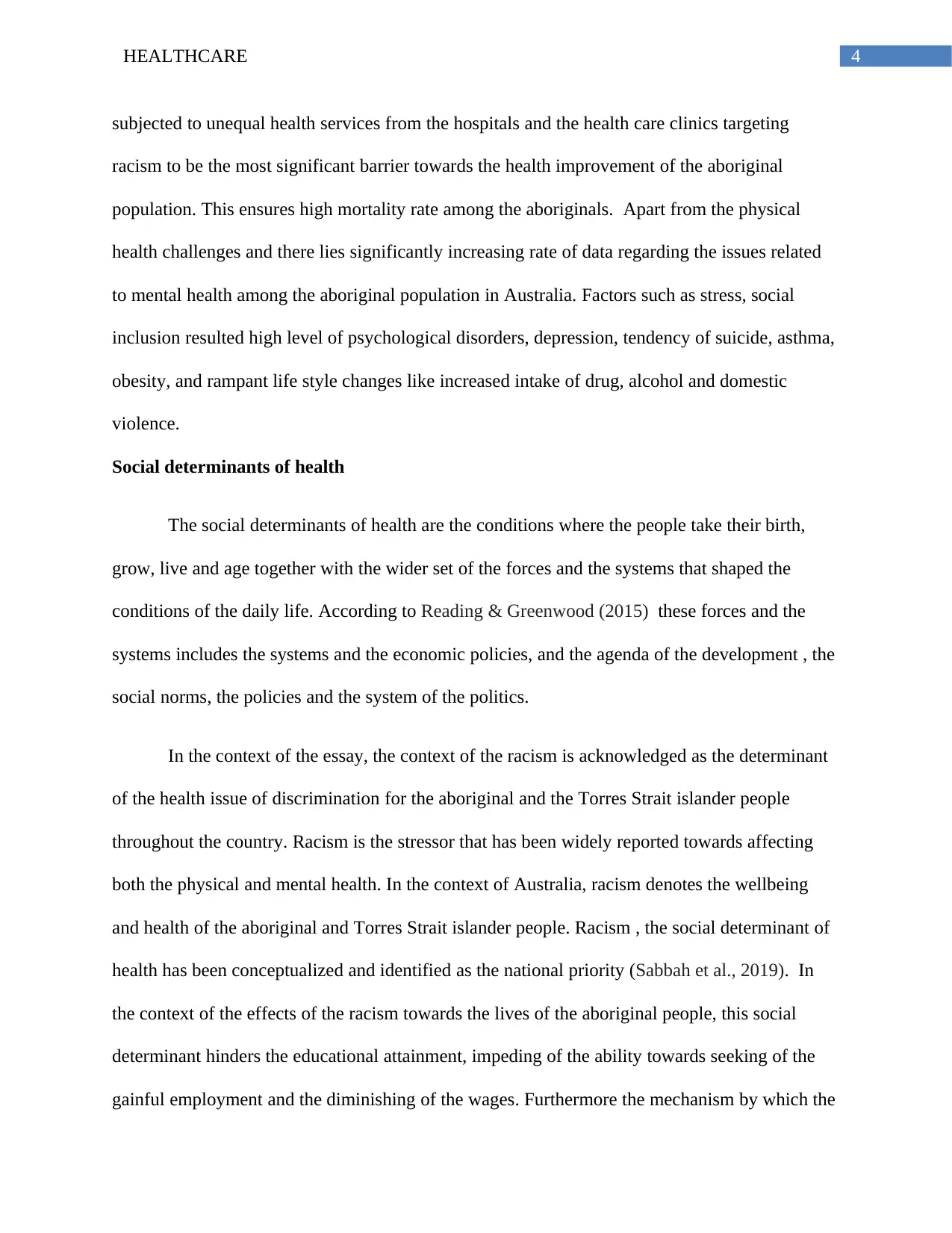
4HEALTHCARE
subjected to unequal health services from the hospitals and the health care clinics targeting
racism to be the most significant barrier towards the health improvement of the aboriginal
population. This ensures high mortality rate among the aboriginals. Apart from the physical
health challenges and there lies significantly increasing rate of data regarding the issues related
to mental health among the aboriginal population in Australia. Factors such as stress, social
inclusion resulted high level of psychological disorders, depression, tendency of suicide, asthma,
obesity, and rampant life style changes like increased intake of drug, alcohol and domestic
violence.
Social determinants of health
The social determinants of health are the conditions where the people take their birth,
grow, live and age together with the wider set of the forces and the systems that shaped the
conditions of the daily life. According to Reading & Greenwood (2015) these forces and the
systems includes the systems and the economic policies, and the agenda of the development , the
social norms, the policies and the system of the politics.
In the context of the essay, the context of the racism is acknowledged as the determinant
of the health issue of discrimination for the aboriginal and the Torres Strait islander people
throughout the country. Racism is the stressor that has been widely reported towards affecting
both the physical and mental health. In the context of Australia, racism denotes the wellbeing
and health of the aboriginal and Torres Strait islander people. Racism , the social determinant of
health has been conceptualized and identified as the national priority (Sabbah et al., 2019). In
the context of the effects of the racism towards the lives of the aboriginal people, this social
determinant hinders the educational attainment, impeding of the ability towards seeking of the
gainful employment and the diminishing of the wages. Furthermore the mechanism by which the
subjected to unequal health services from the hospitals and the health care clinics targeting
racism to be the most significant barrier towards the health improvement of the aboriginal
population. This ensures high mortality rate among the aboriginals. Apart from the physical
health challenges and there lies significantly increasing rate of data regarding the issues related
to mental health among the aboriginal population in Australia. Factors such as stress, social
inclusion resulted high level of psychological disorders, depression, tendency of suicide, asthma,
obesity, and rampant life style changes like increased intake of drug, alcohol and domestic
violence.
Social determinants of health
The social determinants of health are the conditions where the people take their birth,
grow, live and age together with the wider set of the forces and the systems that shaped the
conditions of the daily life. According to Reading & Greenwood (2015) these forces and the
systems includes the systems and the economic policies, and the agenda of the development , the
social norms, the policies and the system of the politics.
In the context of the essay, the context of the racism is acknowledged as the determinant
of the health issue of discrimination for the aboriginal and the Torres Strait islander people
throughout the country. Racism is the stressor that has been widely reported towards affecting
both the physical and mental health. In the context of Australia, racism denotes the wellbeing
and health of the aboriginal and Torres Strait islander people. Racism , the social determinant of
health has been conceptualized and identified as the national priority (Sabbah et al., 2019). In
the context of the effects of the racism towards the lives of the aboriginal people, this social
determinant hinders the educational attainment, impeding of the ability towards seeking of the
gainful employment and the diminishing of the wages. Furthermore the mechanism by which the
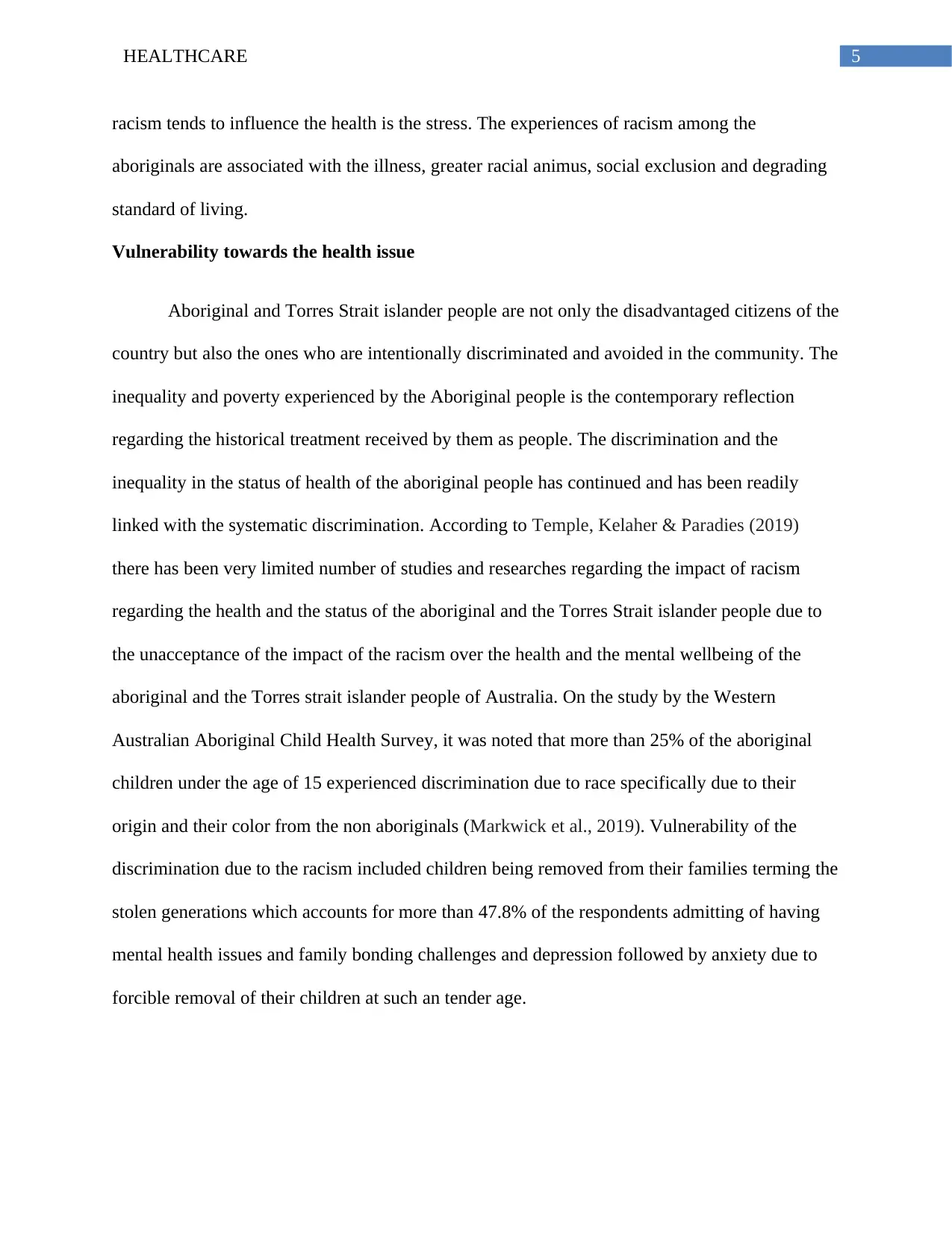
5HEALTHCARE
racism tends to influence the health is the stress. The experiences of racism among the
aboriginals are associated with the illness, greater racial animus, social exclusion and degrading
standard of living.
Vulnerability towards the health issue
Aboriginal and Torres Strait islander people are not only the disadvantaged citizens of the
country but also the ones who are intentionally discriminated and avoided in the community. The
inequality and poverty experienced by the Aboriginal people is the contemporary reflection
regarding the historical treatment received by them as people. The discrimination and the
inequality in the status of health of the aboriginal people has continued and has been readily
linked with the systematic discrimination. According to Temple, Kelaher & Paradies (2019)
there has been very limited number of studies and researches regarding the impact of racism
regarding the health and the status of the aboriginal and the Torres Strait islander people due to
the unacceptance of the impact of the racism over the health and the mental wellbeing of the
aboriginal and the Torres strait islander people of Australia. On the study by the Western
Australian Aboriginal Child Health Survey, it was noted that more than 25% of the aboriginal
children under the age of 15 experienced discrimination due to race specifically due to their
origin and their color from the non aboriginals (Markwick et al., 2019). Vulnerability of the
discrimination due to the racism included children being removed from their families terming the
stolen generations which accounts for more than 47.8% of the respondents admitting of having
mental health issues and family bonding challenges and depression followed by anxiety due to
forcible removal of their children at such an tender age.
racism tends to influence the health is the stress. The experiences of racism among the
aboriginals are associated with the illness, greater racial animus, social exclusion and degrading
standard of living.
Vulnerability towards the health issue
Aboriginal and Torres Strait islander people are not only the disadvantaged citizens of the
country but also the ones who are intentionally discriminated and avoided in the community. The
inequality and poverty experienced by the Aboriginal people is the contemporary reflection
regarding the historical treatment received by them as people. The discrimination and the
inequality in the status of health of the aboriginal people has continued and has been readily
linked with the systematic discrimination. According to Temple, Kelaher & Paradies (2019)
there has been very limited number of studies and researches regarding the impact of racism
regarding the health and the status of the aboriginal and the Torres Strait islander people due to
the unacceptance of the impact of the racism over the health and the mental wellbeing of the
aboriginal and the Torres strait islander people of Australia. On the study by the Western
Australian Aboriginal Child Health Survey, it was noted that more than 25% of the aboriginal
children under the age of 15 experienced discrimination due to race specifically due to their
origin and their color from the non aboriginals (Markwick et al., 2019). Vulnerability of the
discrimination due to the racism included children being removed from their families terming the
stolen generations which accounts for more than 47.8% of the respondents admitting of having
mental health issues and family bonding challenges and depression followed by anxiety due to
forcible removal of their children at such an tender age.
⊘ This is a preview!⊘
Do you want full access?
Subscribe today to unlock all pages.

Trusted by 1+ million students worldwide
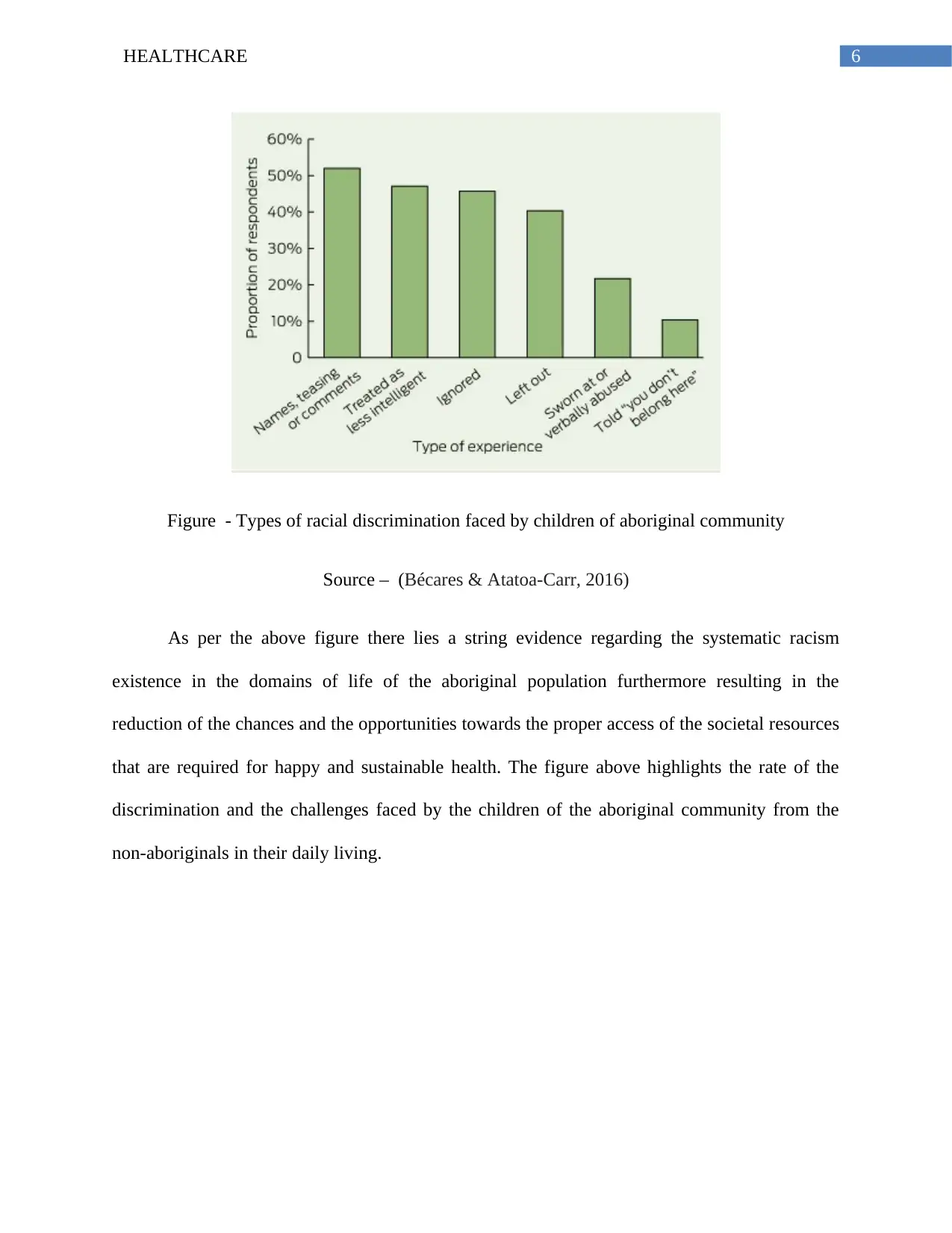
6HEALTHCARE
Figure - Types of racial discrimination faced by children of aboriginal community
Source – (Bécares & Atatoa-Carr, 2016)
As per the above figure there lies a string evidence regarding the systematic racism
existence in the domains of life of the aboriginal population furthermore resulting in the
reduction of the chances and the opportunities towards the proper access of the societal resources
that are required for happy and sustainable health. The figure above highlights the rate of the
discrimination and the challenges faced by the children of the aboriginal community from the
non-aboriginals in their daily living.
Figure - Types of racial discrimination faced by children of aboriginal community
Source – (Bécares & Atatoa-Carr, 2016)
As per the above figure there lies a string evidence regarding the systematic racism
existence in the domains of life of the aboriginal population furthermore resulting in the
reduction of the chances and the opportunities towards the proper access of the societal resources
that are required for happy and sustainable health. The figure above highlights the rate of the
discrimination and the challenges faced by the children of the aboriginal community from the
non-aboriginals in their daily living.
Paraphrase This Document
Need a fresh take? Get an instant paraphrase of this document with our AI Paraphraser
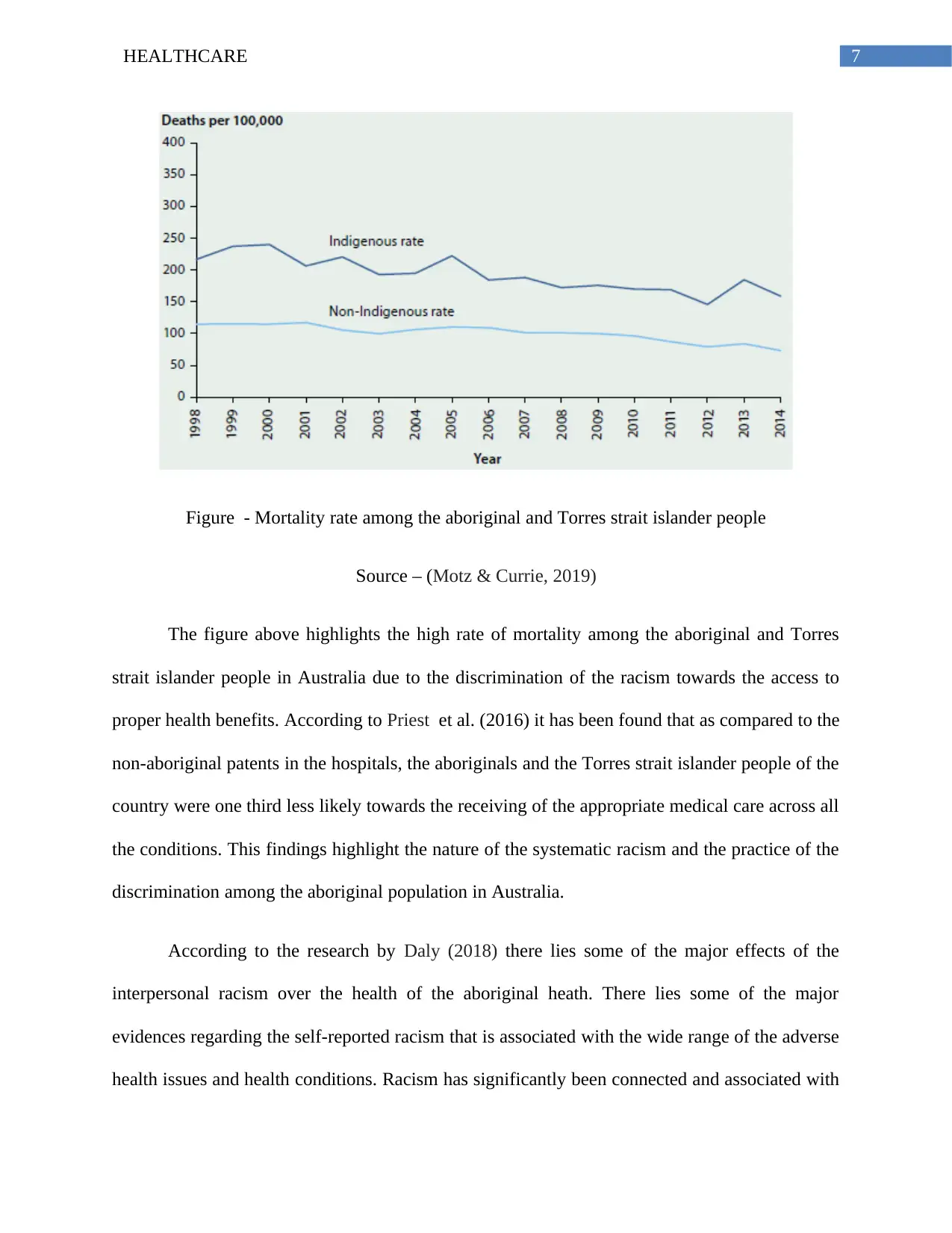
7HEALTHCARE
Figure - Mortality rate among the aboriginal and Torres strait islander people
Source – (Motz & Currie, 2019)
The figure above highlights the high rate of mortality among the aboriginal and Torres
strait islander people in Australia due to the discrimination of the racism towards the access to
proper health benefits. According to Priest et al. (2016) it has been found that as compared to the
non-aboriginal patents in the hospitals, the aboriginals and the Torres strait islander people of the
country were one third less likely towards the receiving of the appropriate medical care across all
the conditions. This findings highlight the nature of the systematic racism and the practice of the
discrimination among the aboriginal population in Australia.
According to the research by Daly (2018) there lies some of the major effects of the
interpersonal racism over the health of the aboriginal heath. There lies some of the major
evidences regarding the self-reported racism that is associated with the wide range of the adverse
health issues and health conditions. Racism has significantly been connected and associated with
Figure - Mortality rate among the aboriginal and Torres strait islander people
Source – (Motz & Currie, 2019)
The figure above highlights the high rate of mortality among the aboriginal and Torres
strait islander people in Australia due to the discrimination of the racism towards the access to
proper health benefits. According to Priest et al. (2016) it has been found that as compared to the
non-aboriginal patents in the hospitals, the aboriginals and the Torres strait islander people of the
country were one third less likely towards the receiving of the appropriate medical care across all
the conditions. This findings highlight the nature of the systematic racism and the practice of the
discrimination among the aboriginal population in Australia.
According to the research by Daly (2018) there lies some of the major effects of the
interpersonal racism over the health of the aboriginal heath. There lies some of the major
evidences regarding the self-reported racism that is associated with the wide range of the adverse
health issues and health conditions. Racism has significantly been connected and associated with
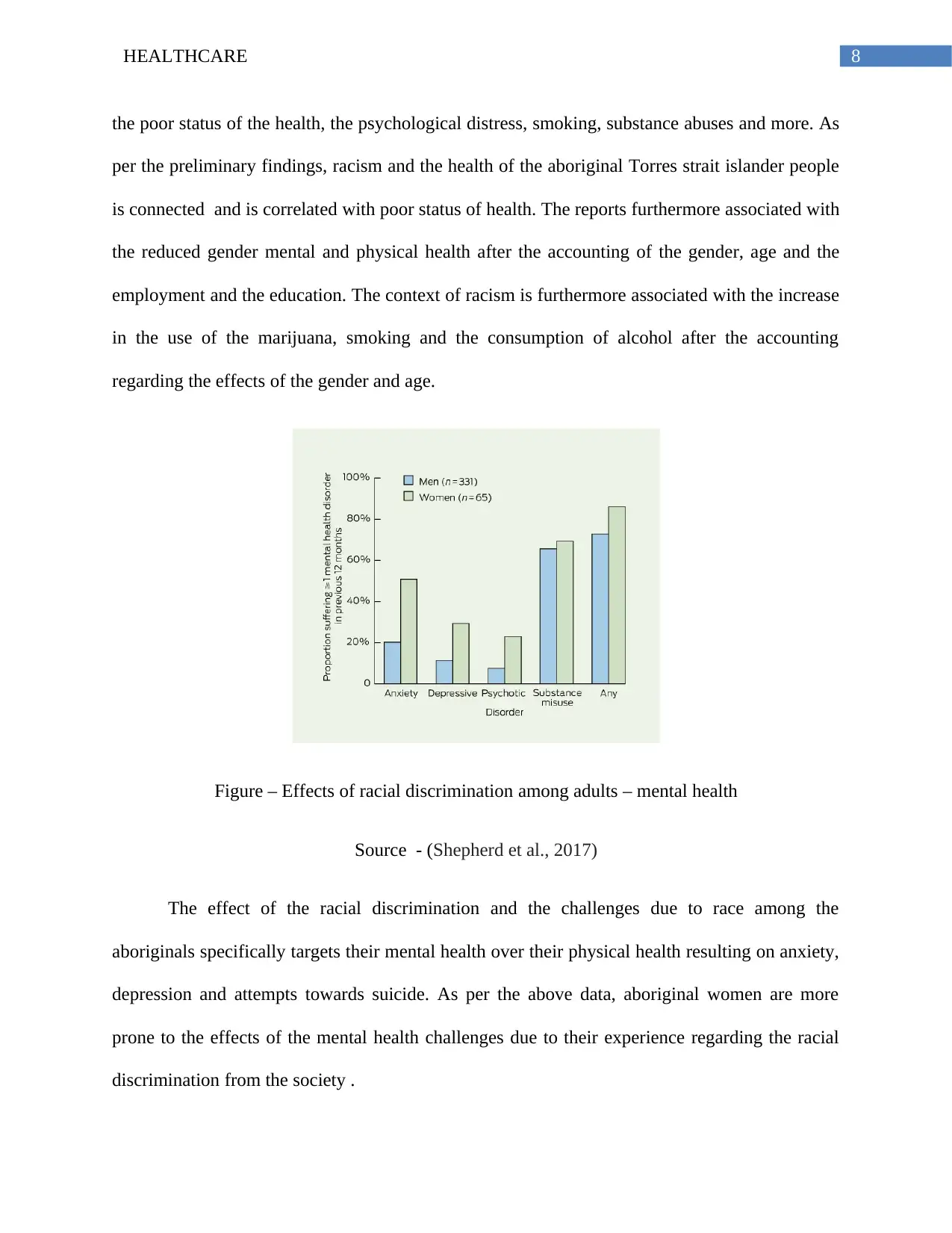
8HEALTHCARE
the poor status of the health, the psychological distress, smoking, substance abuses and more. As
per the preliminary findings, racism and the health of the aboriginal Torres strait islander people
is connected and is correlated with poor status of health. The reports furthermore associated with
the reduced gender mental and physical health after the accounting of the gender, age and the
employment and the education. The context of racism is furthermore associated with the increase
in the use of the marijuana, smoking and the consumption of alcohol after the accounting
regarding the effects of the gender and age.
Figure – Effects of racial discrimination among adults – mental health
Source - (Shepherd et al., 2017)
The effect of the racial discrimination and the challenges due to race among the
aboriginals specifically targets their mental health over their physical health resulting on anxiety,
depression and attempts towards suicide. As per the above data, aboriginal women are more
prone to the effects of the mental health challenges due to their experience regarding the racial
discrimination from the society .
the poor status of the health, the psychological distress, smoking, substance abuses and more. As
per the preliminary findings, racism and the health of the aboriginal Torres strait islander people
is connected and is correlated with poor status of health. The reports furthermore associated with
the reduced gender mental and physical health after the accounting of the gender, age and the
employment and the education. The context of racism is furthermore associated with the increase
in the use of the marijuana, smoking and the consumption of alcohol after the accounting
regarding the effects of the gender and age.
Figure – Effects of racial discrimination among adults – mental health
Source - (Shepherd et al., 2017)
The effect of the racial discrimination and the challenges due to race among the
aboriginals specifically targets their mental health over their physical health resulting on anxiety,
depression and attempts towards suicide. As per the above data, aboriginal women are more
prone to the effects of the mental health challenges due to their experience regarding the racial
discrimination from the society .
⊘ This is a preview!⊘
Do you want full access?
Subscribe today to unlock all pages.

Trusted by 1+ million students worldwide
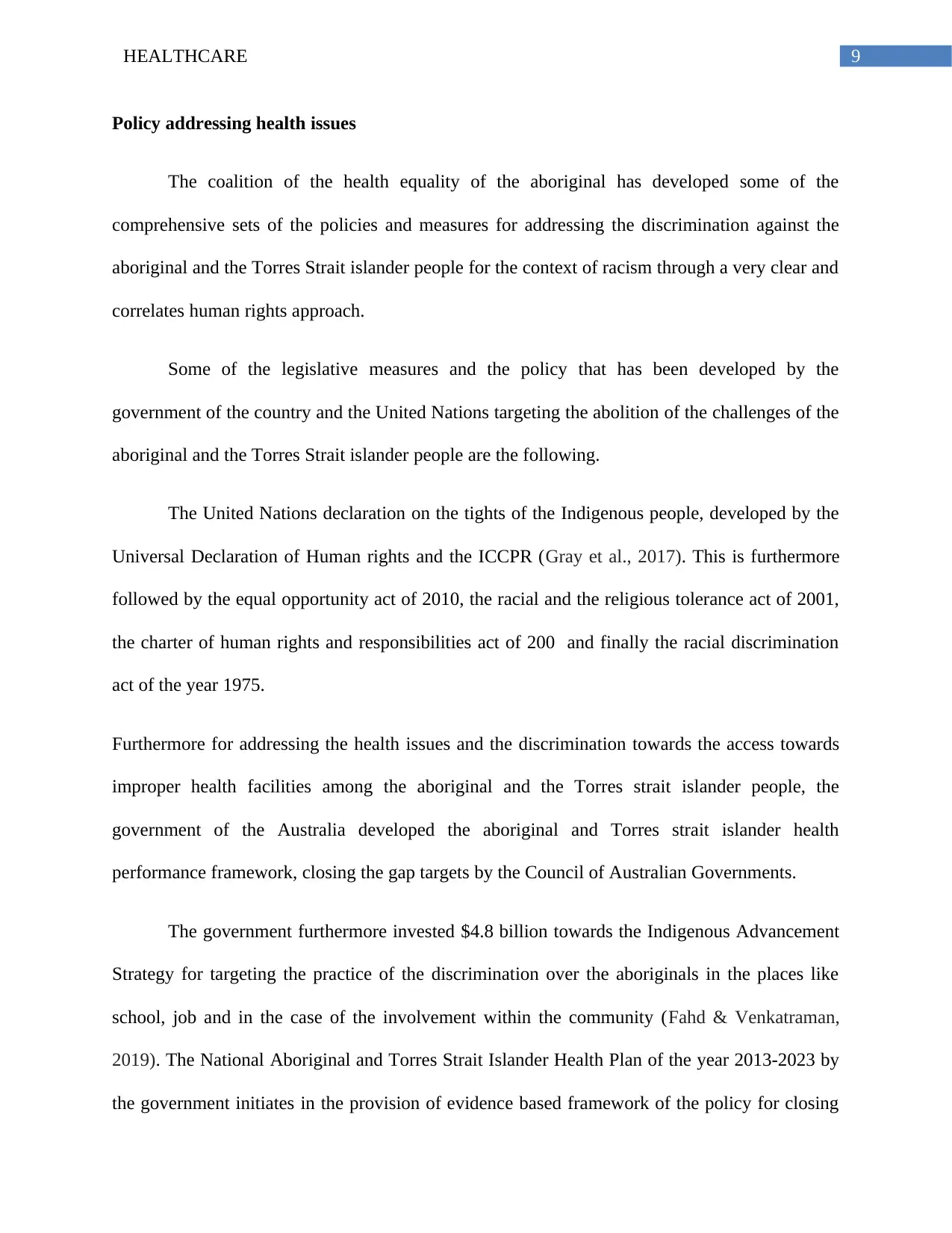
9HEALTHCARE
Policy addressing health issues
The coalition of the health equality of the aboriginal has developed some of the
comprehensive sets of the policies and measures for addressing the discrimination against the
aboriginal and the Torres Strait islander people for the context of racism through a very clear and
correlates human rights approach.
Some of the legislative measures and the policy that has been developed by the
government of the country and the United Nations targeting the abolition of the challenges of the
aboriginal and the Torres Strait islander people are the following.
The United Nations declaration on the tights of the Indigenous people, developed by the
Universal Declaration of Human rights and the ICCPR (Gray et al., 2017). This is furthermore
followed by the equal opportunity act of 2010, the racial and the religious tolerance act of 2001,
the charter of human rights and responsibilities act of 200 and finally the racial discrimination
act of the year 1975.
Furthermore for addressing the health issues and the discrimination towards the access towards
improper health facilities among the aboriginal and the Torres strait islander people, the
government of the Australia developed the aboriginal and Torres strait islander health
performance framework, closing the gap targets by the Council of Australian Governments.
The government furthermore invested $4.8 billion towards the Indigenous Advancement
Strategy for targeting the practice of the discrimination over the aboriginals in the places like
school, job and in the case of the involvement within the community (Fahd & Venkatraman,
2019). The National Aboriginal and Torres Strait Islander Health Plan of the year 2013-2023 by
the government initiates in the provision of evidence based framework of the policy for closing
Policy addressing health issues
The coalition of the health equality of the aboriginal has developed some of the
comprehensive sets of the policies and measures for addressing the discrimination against the
aboriginal and the Torres Strait islander people for the context of racism through a very clear and
correlates human rights approach.
Some of the legislative measures and the policy that has been developed by the
government of the country and the United Nations targeting the abolition of the challenges of the
aboriginal and the Torres Strait islander people are the following.
The United Nations declaration on the tights of the Indigenous people, developed by the
Universal Declaration of Human rights and the ICCPR (Gray et al., 2017). This is furthermore
followed by the equal opportunity act of 2010, the racial and the religious tolerance act of 2001,
the charter of human rights and responsibilities act of 200 and finally the racial discrimination
act of the year 1975.
Furthermore for addressing the health issues and the discrimination towards the access towards
improper health facilities among the aboriginal and the Torres strait islander people, the
government of the Australia developed the aboriginal and Torres strait islander health
performance framework, closing the gap targets by the Council of Australian Governments.
The government furthermore invested $4.8 billion towards the Indigenous Advancement
Strategy for targeting the practice of the discrimination over the aboriginals in the places like
school, job and in the case of the involvement within the community (Fahd & Venkatraman,
2019). The National Aboriginal and Torres Strait Islander Health Plan of the year 2013-2023 by
the government initiates in the provision of evidence based framework of the policy for closing
Paraphrase This Document
Need a fresh take? Get an instant paraphrase of this document with our AI Paraphraser
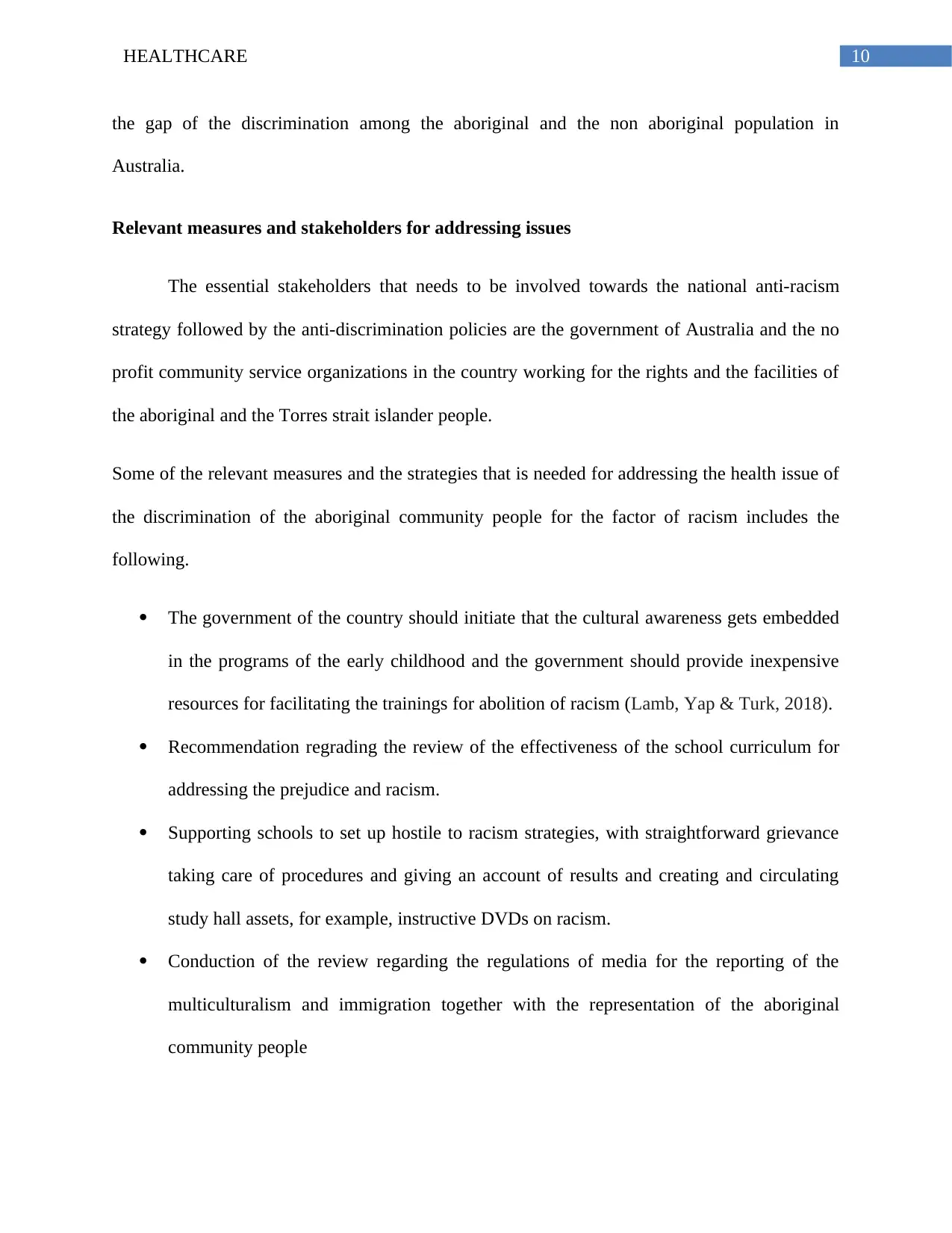
10HEALTHCARE
the gap of the discrimination among the aboriginal and the non aboriginal population in
Australia.
Relevant measures and stakeholders for addressing issues
The essential stakeholders that needs to be involved towards the national anti-racism
strategy followed by the anti-discrimination policies are the government of Australia and the no
profit community service organizations in the country working for the rights and the facilities of
the aboriginal and the Torres strait islander people.
Some of the relevant measures and the strategies that is needed for addressing the health issue of
the discrimination of the aboriginal community people for the factor of racism includes the
following.
The government of the country should initiate that the cultural awareness gets embedded
in the programs of the early childhood and the government should provide inexpensive
resources for facilitating the trainings for abolition of racism (Lamb, Yap & Turk, 2018).
Recommendation regrading the review of the effectiveness of the school curriculum for
addressing the prejudice and racism.
Supporting schools to set up hostile to racism strategies, with straightforward grievance
taking care of procedures and giving an account of results and creating and circulating
study hall assets, for example, instructive DVDs on racism.
Conduction of the review regarding the regulations of media for the reporting of the
multiculturalism and immigration together with the representation of the aboriginal
community people
the gap of the discrimination among the aboriginal and the non aboriginal population in
Australia.
Relevant measures and stakeholders for addressing issues
The essential stakeholders that needs to be involved towards the national anti-racism
strategy followed by the anti-discrimination policies are the government of Australia and the no
profit community service organizations in the country working for the rights and the facilities of
the aboriginal and the Torres strait islander people.
Some of the relevant measures and the strategies that is needed for addressing the health issue of
the discrimination of the aboriginal community people for the factor of racism includes the
following.
The government of the country should initiate that the cultural awareness gets embedded
in the programs of the early childhood and the government should provide inexpensive
resources for facilitating the trainings for abolition of racism (Lamb, Yap & Turk, 2018).
Recommendation regrading the review of the effectiveness of the school curriculum for
addressing the prejudice and racism.
Supporting schools to set up hostile to racism strategies, with straightforward grievance
taking care of procedures and giving an account of results and creating and circulating
study hall assets, for example, instructive DVDs on racism.
Conduction of the review regarding the regulations of media for the reporting of the
multiculturalism and immigration together with the representation of the aboriginal
community people
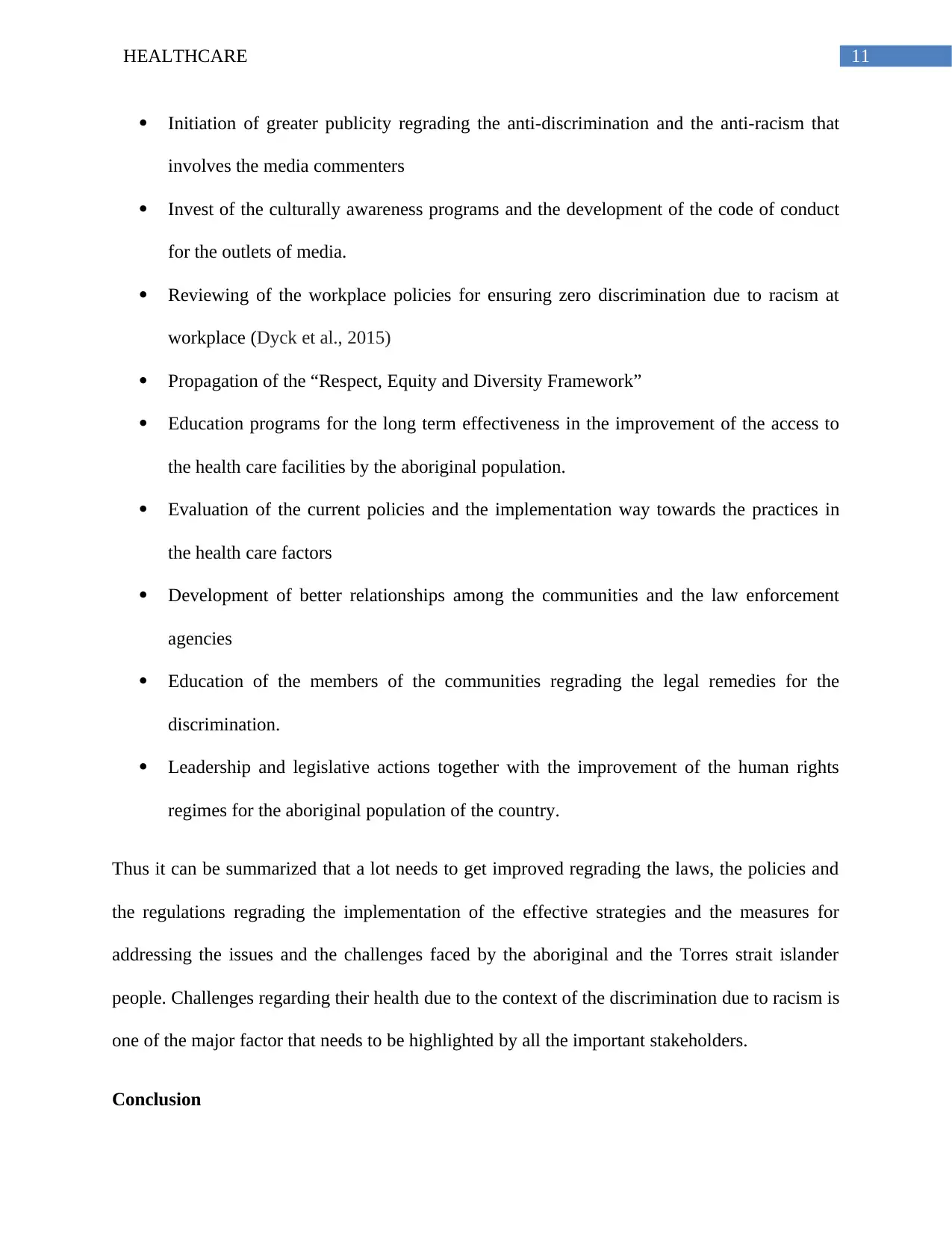
11HEALTHCARE
Initiation of greater publicity regrading the anti-discrimination and the anti-racism that
involves the media commenters
Invest of the culturally awareness programs and the development of the code of conduct
for the outlets of media.
Reviewing of the workplace policies for ensuring zero discrimination due to racism at
workplace (Dyck et al., 2015)
Propagation of the “Respect, Equity and Diversity Framework”
Education programs for the long term effectiveness in the improvement of the access to
the health care facilities by the aboriginal population.
Evaluation of the current policies and the implementation way towards the practices in
the health care factors
Development of better relationships among the communities and the law enforcement
agencies
Education of the members of the communities regrading the legal remedies for the
discrimination.
Leadership and legislative actions together with the improvement of the human rights
regimes for the aboriginal population of the country.
Thus it can be summarized that a lot needs to get improved regrading the laws, the policies and
the regulations regrading the implementation of the effective strategies and the measures for
addressing the issues and the challenges faced by the aboriginal and the Torres strait islander
people. Challenges regarding their health due to the context of the discrimination due to racism is
one of the major factor that needs to be highlighted by all the important stakeholders.
Conclusion
Initiation of greater publicity regrading the anti-discrimination and the anti-racism that
involves the media commenters
Invest of the culturally awareness programs and the development of the code of conduct
for the outlets of media.
Reviewing of the workplace policies for ensuring zero discrimination due to racism at
workplace (Dyck et al., 2015)
Propagation of the “Respect, Equity and Diversity Framework”
Education programs for the long term effectiveness in the improvement of the access to
the health care facilities by the aboriginal population.
Evaluation of the current policies and the implementation way towards the practices in
the health care factors
Development of better relationships among the communities and the law enforcement
agencies
Education of the members of the communities regrading the legal remedies for the
discrimination.
Leadership and legislative actions together with the improvement of the human rights
regimes for the aboriginal population of the country.
Thus it can be summarized that a lot needs to get improved regrading the laws, the policies and
the regulations regrading the implementation of the effective strategies and the measures for
addressing the issues and the challenges faced by the aboriginal and the Torres strait islander
people. Challenges regarding their health due to the context of the discrimination due to racism is
one of the major factor that needs to be highlighted by all the important stakeholders.
Conclusion
⊘ This is a preview!⊘
Do you want full access?
Subscribe today to unlock all pages.

Trusted by 1+ million students worldwide
1 out of 17
Related Documents
Your All-in-One AI-Powered Toolkit for Academic Success.
+13062052269
info@desklib.com
Available 24*7 on WhatsApp / Email
![[object Object]](/_next/static/media/star-bottom.7253800d.svg)
Unlock your academic potential
Copyright © 2020–2026 A2Z Services. All Rights Reserved. Developed and managed by ZUCOL.




